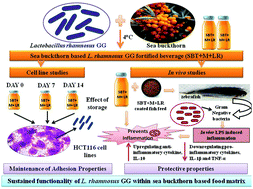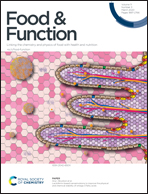Adhesion and anti-inflammatory potential of Lactobacillus rhamnosus GG in a sea buckthorn based beverage matrix†
Abstract
The consumption of probiotic based foods due to their health promoting effects has increased over the years. The consumption of probiotic based foods, due to their health promoting effects, has increased over the years. Due to this rising demands, the application platforms of the food industry have directed their efforts in the development of novel functional probiotic beverages. The presence of dietary phenolics and other beneficial components has made fruit-based matrices more popular for probiotic delivery. However, very few studies to date have evaluated the impact of carrier matrices on the in vivo functionality of probiotic strains with specific biomarkers and targeted towards specific disease conditions. In this study, we investigated the effect of a sea buckthorn (Hippophae rhamnoides L.) based, malt supplemented, beverage matrix (SBT + M) on the physiological characteristics of the probiotic strain L. rhamnosus GG (ATCC 53103) (LR). No significant difference in the auto-aggregation and co-aggregation rates of LR fortified in SBT + M was observed compared to LR alone. Storage conditions (4 °C for 14 days) did not affect the survival and the adhesion potential of LR to the HCT116 cell line. More importantly, this study also determined the protective effect of SBT + M on the in vivo functionality of LR in alleviating LPS induced inflammation in zebrafish (Danio rerio). The results showed that administration with SBT + M + LR significantly alleviated the LPS induced colonic damage, evidenced by the decrease in the overall histological and goblet cell scores compared to the LPS-treated group. The protective effect of SBT + M + LR was higher compared to the effects of SBT + M or LR alone. The colonic expression of pro-inflammatory cytokines (TNF-α and IL-1β) showed a marked decline by 84.7% and 86.5% respectively. The highest expression of the anti-inflammatory cytokine IL-10 was recorded in the SBT + M + LR treated group (p < 0.001). The overall results reveal that the administration of SBT + M + LR showed the best effects in alleviating the LPS induced intestinal damage compared to the other test groups (SBT + M and LR). These protective effects could be attributed to the phenolic compounds present in the SBT matrix. Our study indicates the contributory role of the carrier matrix and merits further investigation for its use as a potential therapeutic agent for gastrointestinal inflammation.



 Please wait while we load your content...
Please wait while we load your content...